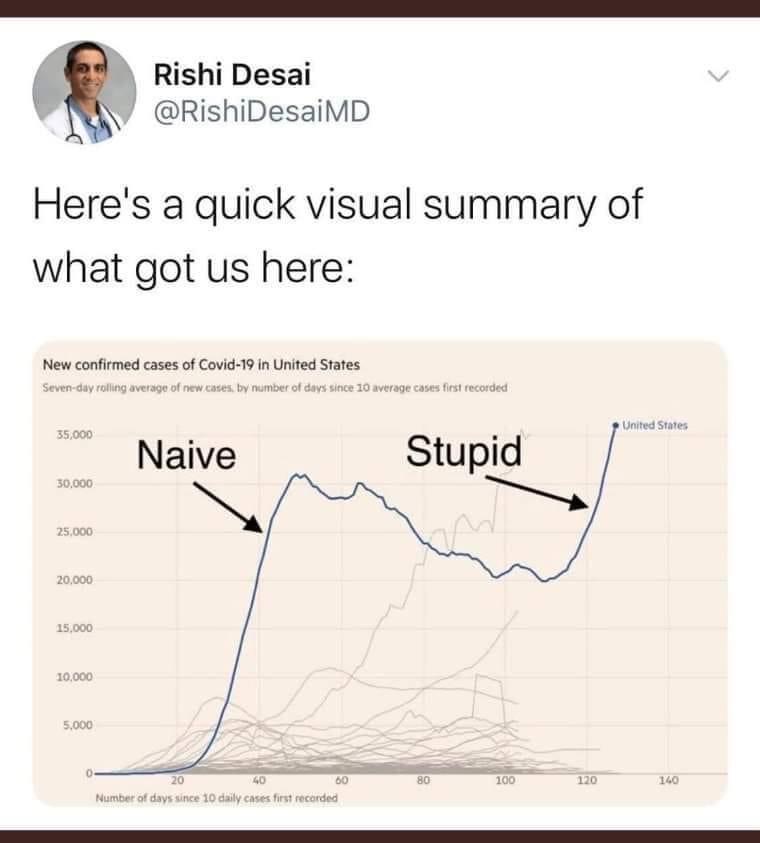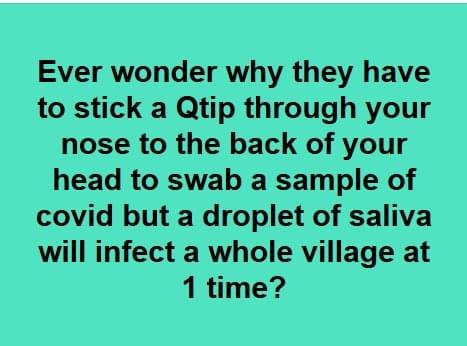Coronavirus
1 ...
5657585960616263
1 ...
5657585960616263
|
I don't find death stats useful for assorted reasons. How testing is happening, or not, and the way death certificates are filled out means a death is not necessarily recorded in a way that helps understand the situation in a given state, region, or country. Trends matter more than absolute numbers in general.
The stats I look at now are: * R effective, or Rt * Percent positive * Hospital usage Unfortunately, it's back to Flatten The Curve in places like Houston and Phoenix. Websites I've found useful for stats in the last couple months: https://covidtracking.com https://rt.live https://testandtrace.com You can use rt.live to compare the situation 2 or 3 months ago to this week. Or look at one state for details. Most, if not all, states include Percent Positive on their stats Dashboard. Some take it to the county level. Most show data for outbreaks such as those at long term care facilities. One reason I'm not too concerned about daily life is that my county in NC has been holding steady on Percent Positive for a while. My neighborhood happens to be highly educated, plenty of people are still employed working from home, and the local supermarkets within a few miles are stocked and not crowded midweek. I handle long distance driving trips a bit differently than before in terms of where I stop for gas and/or a restroom. I'm driving along routes I know well and know what motels I'm willing to trust. So far, so good. First hand observation helps to put headlines and stats in context. |
|
In reply to this post by Harvey
What I've read since March is that "herd immunity" for COVID-19 probably requires 60% of the population to have been infected. The highest rate I've seen from sampling studies using good serology anti-body tests is around 25%. If COVID-19 is like the common cold and people can get it again . . . The virus that caused the 1918 pandemic was around for 1-2 years in the places that were hit. |
|
In reply to this post by Brownski
There are lots of viruses. But what happens with them doesn't apply. COVID-19 is a coronavirus. There isn't a vaccine for either of the more recent coronaviruses, SARS and MERS. Perhaps because research stopped or slowed because the fatalities rates were so high that the spread stopped relatively quickly. Not only because those infected died, but also because only people with symptoms were contagious so others would stay away and not get infected. There is more reason to believe that any immunity someone gets from a mild case of COVID-19 is temporary. Meaning a few months, perhaps a year. I'm not a medical professional. Did a lot of reading in March-May and also got insights from people who are in medicine or have a science background. The information for COVID-19 and SARS-CoV-2 is available about ongoing scientific research in a way that's very unusual. But it takes some digging and time to sort thru the early thinking to find the consensus thinking that emerges after months instead of years. |
|
For stats for all states in a consistent format, I sometimes look at this webpage.
https://www.nytimes.com/interactive/2020/us/coronavirus-us-cases.html At the bottom, here's the general advice for staying safe while going out of the house. A non-medical mask or cloth face covering does not do much to protect you from droplets. But it does tend to keep people from touching their face as often if it's worn correctly, especially around their mouth or nose. It also makes it less likely that someone who is contagious but asymptomatic or pre-symptomatic will cough or sneeze and spread a lot of droplets farther away than a few feet. What you can do Experts’ understanding of how the Covid-19 works is growing. It seems that there are four factors that most likely play a role: how close you get to an infected person; how long you are near that person; whether that person expels viral droplets on or near you; and how much you touch your face afterwards. You can help reduce your risk and do your part to protect others by following some basic steps: Keep your distance from others. Stay at least six feet away from people outside your household as much as possible. Wash your hands often. Anytime you come in contact with a surface outside your home, scrub with soap for at least 20 seconds, rinse and then dry your hands with a clean towel. Avoid touching your face. The virus primarily spreads when contaminated hands touch our nose or mouth or eyes. Try to keep your hands away from your face unless you have just recently washed them. Wear a mask outside your home. A mask protects others from any potential infection from you. The more people who wear masks, the more we all stay safer. |
|
Prof. Erin Bromage is an Australian professor and father teaching near Boston. His speciality is Microbiology and Immunology. His friends encouraged him to make a few of his private Facebook posts more accessible a couple months ago. The media didn't take long to find his blog.
In his blog entry about masks, there is a picture of fans at a Georgia Tech football game wearing masks. There was a law in San Francisco about face masks that was in, then out, then in again . . . after many people died in late Dec 2018 when people stopped wearing them. There are references at the end of his article. May 29, updated June 22, Erin Bromage's blog https://www.erinbromage.com/post/what-s-the-deal-with-masks " . . . I want to emphasize that there is not clear evidence to indicate that cloth masks will protect you from inhaling the smallest infected respiratory droplets (those droplet nuclei) from another person. The primary purpose of a cloth mask, when worn by everyone, is to serve as a control for source emissions. If we lower the respiratory droplets coming out of us, we can substantially lower the amount of virus put into the air, thereby lowering the risk to everyone. My mask protects you - Your mask protects me . . ." |

Life ain't a dress rehearsal: Spread enthusiasm , avoid negative nuts.
|
|
Administrator
|
Raise your hand if you think the mask is protecting you.
Just like I thought. No one thinks it. I'm distancing and wearing my mask for one reason. I want everyone else to do it and feel that I can't expect it if I don't do it myself.
"You just need to go at that shit wide open, hang on, and own it." —Camp
|
|
My n95 mask protects me. When I'm around people wearing masks I put the cheapy on. When I am at a store I put the n95 on so I don't have pay much attention to the jerks.
|
|
Administrator
|
I was referring to the masks that 99% of us are wearing.
"You just need to go at that shit wide open, hang on, and own it." —Camp
|
|
Administrator
|
No I didn't. What is your theory?
"You just need to go at that shit wide open, hang on, and own it." —Camp
|
|
In reply to this post by Harvey
Same It's simply respectful. |
|
It’s like a drunk driving. You can do it if you want, and yeah, you might get home fine.
But you might also be responsible for the death of someone around you (maybe even a loved one), so you should probably try to not drive drunk/wear a mask. |
|
In reply to this post by campgottagopee
that's like asking MC to stop whining for free shit. Get a 95.
|
Whining for free shit? Give me some examples here. |
|
In reply to this post by tjf1967
I just stay away from people ---- don't like most of them anyway  |
I don’t believe you. I think you’re gonna miss being in sales before you know it. I’m sick of wearing a mask, putting it on and off all day. I don’t know who I’m protecting but it seems like a modest, common sense precaution and it’s not a political statement for me.
"You want your skis? Go get 'em!" -W. Miller
|
|
I've learned to never say never but it's very unlikely I'd go back into sales. I'm enjoying the challenge of chasing cars all over the country.
|
|
Administrator
|
Hoping yesterday's jump in US death toll is not the start of a new trend, but logic would indicate otherwise.
Largest number in a month.
"You just need to go at that shit wide open, hang on, and own it." —Camp
|
«
Return to Off Topic
|
1 view|%1 views



